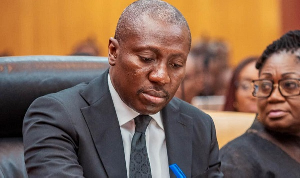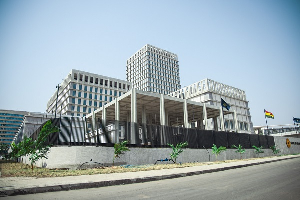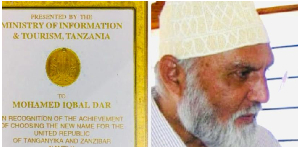Mariano Barreto, a former coach of the Black Stars, remarked that “If talking were a competitive sport at the Olympic Games, Ghana will no doubt win gold".
And the fact remains that, Ghanaians as a people take too much interest in mere talking; we talk endlessly about problems, on radio, television, in the newspapers, at family and social gatherings without doing anything else about them, leaving it bare. Indeed, Ghanaians are specialist in talking without any feasible action and that's the easiest thing to do as far as humans are concerned.
Recently, there have been a number of activists campaigning vehemently against illegal mining (galamsey) and calling on the government to put a halt to this booming venture in the mining communities. The activists – NGOs, social and political pundits – are of the view that our water bodies, be it lakes and streams are under threat if measures are not put in place to curb galamsey which is on the rise in every passing breath.
However, I call this campaign against galamsey as a loose talk which may not yield any fruitful results if the problem is addressed just at the grassroots.
I'm not against the campaign to stop these illegal mining activities known as galamsey, so don't think I'm against the progress of our motherland (Ghana), but truth will always stand supreme no matter the threats.
Simply put, I have a conviction that the issue at hand is wrongly addressed by the various pundits and activists. I have a few rhetorical questions to ask and it is high time those campaigning against galamsey looked at these issues in order to restructure their approach.
Firstly, who watches the watchman? On records, it will interest every Ghanaian to know that there are high profile men in the country who are behind most of the galamsey operators and are sponsoring their illegal operations.
To the best of my knowledge, before one could get the chance in every mining community to operate, there must be an issue of work permit by those in authority including the chiefs and queen mothers in the affected areas and also the government instituted board on small scale mining.
Sometimes, permits or approval letters are issued by those at the top of affairs. Consequently, members of the community do not have a say to stop the operators. Likewise, the farmers, after leasing their lands in exchange of a whooping amount of money for galamsey to take place, are now lamenting and shouting “STOP GALAMSEY".
More importantly, who needs to be blamed? The government of Ghana must be first accused for the unfortunate incident going on in the form of galamsey.
Not too long ago, former president John Dramani Mahama evacuated majority of the Chinese in these mining communities to the satisfaction of the ordinary Ghanaian. Sadly, within a twinkle of an eye, the very people who were forced to leave the country are back, this time in multitudes.
What and who brought them back to resume their activity which is putting our environment and aquatic habitat in danger? Our leaders keep borrowing amidst plenty of resources, hence they refuse to say 'NO' to certain loans and grants conditions that stand the chance of putting their citizens in danger as Ghanaians are experiencing now. Once again, the government of Ghana needs to be blamed!
To make a long story short, the government of Ghana holds the major key in terms of solving this problem.
In view of this, instead of talking and making noise on radio and social media platforms about “STOP GALAMSEY", the best way out is for the various group activists and media houses to channel their grievances to the government, chiefs and queen mothers in the mining communities not forgetting the various stakeholders we can lay hands on.
Also, the issue of unemployment must be dealt with in such communities. How do you expect those living in the mining communities to survive after quitting the galamsey since it's their major source of employment?
It will interest you to know that some of the galamsey operators are graduates who have tried all means to get employed after school but all proved futile. As a as a result of societal pressure, they have no choice than to travel to these mining communities just for daily bread.
So who should be blamed here?
In short, it is the fervent hope of every loyal Ghanaian including me to curb this growing canker, but the ultimate task rests in the hands of the government and the parliamentarians.
But as far as they continue to knock on the doors of our environmental enemies (Chinese) and beg for aids and grants, I am unsure if the cry of Ghanaians will yield the desired expectations.
Opinions of Monday, 17 April 2017
Columnist: Adu Sarpeah, UCC



















